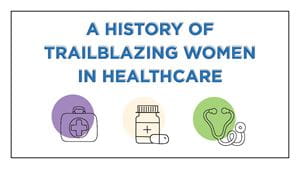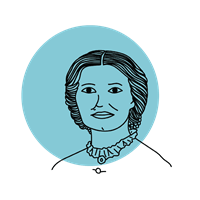
March is Women’s History Month, a time to honor the women in our history whose legacy paved the way for the women of today. Not only that, but March 8th is International Women’s Day, a day dedicated to celebrating the strength, resilience, and intelligence of women throughout the world.
Women have played an important role in health care for centuries. In celebration of Women’s History Month and International Women’s Day, we’re honoring ten trailblazing women in the history of healthcare.

The first woman in the United States to earn a medical degree, Dr. Elizabeth Blackwell paved the path for innumerable women to follow. Dr. Blackwell faced years of discrimination before graduating first in her class from Geneva Medical College in New York in 1849.
After moving to New York City to pursue a career in medicine, she continued to face hardships when looking for work—but that didn’t stop her. In 1857, Dr. Blackwell opened the New York Infirmary for Women and Children with a mission to provide positions for women physicians. A true pioneer for women in the medical field, Dr. Blackwell also opened a medical college for women in New York City, where countless women followed in her footsteps.

A pioneer of modern nursing practice, Florence Nightingale is often referred to as “the lady with the lamp,” for her nighttime rounds to wounded soldiers during the Crimean War in the 1850s.
Her work as a nurse transformed the standard for hospital and care facilities forever. During her time at the military hospital, Nightingale improved sanitary conditions so drastically, that mortality rates decreased from 40 percent to just 2 percent. After returning home, she continued her efforts and sparked new standards and safe nursing practices that would carry on forever.

Dr. Rebecca Lee Crumpler was the first Black woman in the United States to earn a medical degree. Challenging the prejudice that stopped so many Black Americans from pursuing careers in medicine, Dr. Crumpler graduated from New England Female Medical College in 1864.
Dr. Crumpler’s focus was on helping others—whether it was medically or otherwise—and she was devoted to helping those suffering. Her strength, resilience, and bravery brought about a turning point in the history of women in healthcare.

In all of American History, only one woman has received the Presidential Medal of Honor—and that woman was Dr. Mary Edwards Walker. Not only that, but Dr. Walker was also the first female U.S. Army surgeon. She was a women’s rights advocate, an abolitionist—and a true pioneer for women in healthcare.
Dr. Walker was awarded the Presidential Medal of Honor by President Andrew Johnson for her noble work as surgeon during the Civil War. Often crossing battle lines to care for soldiers and civilians, nothing stopped Dr. Walker from providing medical attention to those in need. Dr. Walker’s dedication and compassion continue to be celebrated and her legacy honored today.

The first woman to be elected president of the New York Cancer Society, Dr. Jane Wright dedicated her career to researching cancer treatments. Highlighting her fruitful career, Dr. Wright was appointed to the President’s Commission on Heart Disease, Cancer, and Stroke, and worked as associate dean at New York Medical College.
During a time when Black American women physicians were few and far between, Dr. Wright was the highest-ranked Black American woman at a nationally recognized medical institution. Her research pioneered new cancer treatment techniques that have impacted treatments available today.

Known for her humanitarian work and for founding the American Red Cross, Clara Barton was a woman of compassion and determination. In 1861, Barton left her job to dedicate her time to bringing supplies to soldiers and tending to those wounded, sparking a life-long career in aiding those in times of need.
Before leaving the Red Cross where she aided with countless disasters and helped the homeless and poor, Barton established the National First Aid Association of America, an organization that brought awareness to the importance of emergency preparedness and developed first aid kits.

The first Native American woman in the United States to earn a medical degree, Dr. Susan La Flesche Picotte had an extraordinary career. She helped over 1,300 people by providing financial advice, resolving family disputes, and providing access to medical care any day at any time.
In 1913, Dr. Picotte opened a hospital in the reservation town of Walthill, Nebraska, providing better access to those in the area. Her legacy is still honored today, as the hospital is now a museum dedicated to her and her trailblazing work in healthcare history.

Dr. Antonia Novello was the first woman and the first Hispanic to serve as surgeon general of the United States.
While her focus was pediatrics, her work touched every corner of healthcare and medicine. Dr. Novello served in the U.S. Public Health Service Commissioned Corps for many years, working with the National Institute of Arthritis, Metabolism and Digestive Disorders. She later became deputy director of the National Institute of Child Health and Human Development, focusing on pediatric AIDS.
Alongside countless campaigns, Dr. Novello’s most notable impact is her initiative to end tobacco advertisements targeting children. Her work in healthcare has greatly contributed to enhanced ethical practices and standards.

The first woman to be elected president of the American Medical Association (AMA), Dr. Nancy Dickey is an educator, leader, and a passionate caregiver. When she started her relationship with the organization as an elected member of the AMA Council on Medical Services, she was 26 years old--the youngest to have ever held that position.
Dr. Dickey is currently serving as president of the Texas A&M University System Health Science Center and vice chancellor for health affairs. She continues to bring light to women in healthcare as she serves on the Board of Trustees of the Foundation for the History of Women in Medicine.

After her notable role as president of the American Medical Association, Dr. Ardis Dee Hoven became the first female chair of the World Medical Association. In her role, she represented physicians from 111 national medical associations.
Her mission as chair and beyond has been to give a voice to physicians and patients with help from the organizations that she has been a part of. Dr. Hoven’s work in transforming the role health organizations have in advocacy and communication continues to benefit care today.